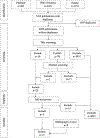A systematic review of audit tools for evaluating the quality of green spaces in mental health research
- PMID: 38340496
- PMCID: PMC10957304
- DOI: 10.1016/j.healthplace.2024.103185
A systematic review of audit tools for evaluating the quality of green spaces in mental health research
Abstract
Research showing the relationship between exposure to green space and health has yielded conflicting results, possibly due to the oversight of green space quality in quantitative studies. This systematic review, guided by the PRISMA framework (registered under Prospero ID CRD42023279720), focused on audit tools for green space quality in mental health research. From 4028 studies, 13 were reviewed, with 77 % linking better mental health outcomes to higher green space quality. Eight tools, especially Public Open Space and Dillen et al. tools demonstrated strong correlations with mental health. Certain green space qualities like grass, pathways, and water elements showed positive health associations. Future research should aim for standardized quality metrics and robust methodologies to support causal inferences and efficient assessments.
Keywords: Green space; Mental health; Natural environment; Quality assessment; Well-being.
Copyright © 2024 Elsevier Ltd. All rights reserved.
References
-
- Alderton A, O’Connor M, Badland H, Gunn L, Boulange C, Villanueva K, 2022. Access to and quality of neighbourhood public open space and children’s mental health outcomes: evidence from population linked data across eight Australian capital cities. Int. J. Environ. Res. Publ. Health 19 (11), 6780. - PMC - PubMed
-
- Amano T, Butt I, Peh KSH, 2018. The importance of green spaces to public health: a multi-continental analysis. Ecol. Appl. 28 (6), 1473–1480. - PubMed
-
- Ayala-Azcárraga C, Diaz D, Zambrano L, 2019. Characteristics of urban parks and their relation to user well-being. Landsc. Urban Plann. 189, 27–35.
Publication types
MeSH terms
Grants and funding
LinkOut - more resources
Full Text Sources
Medical


